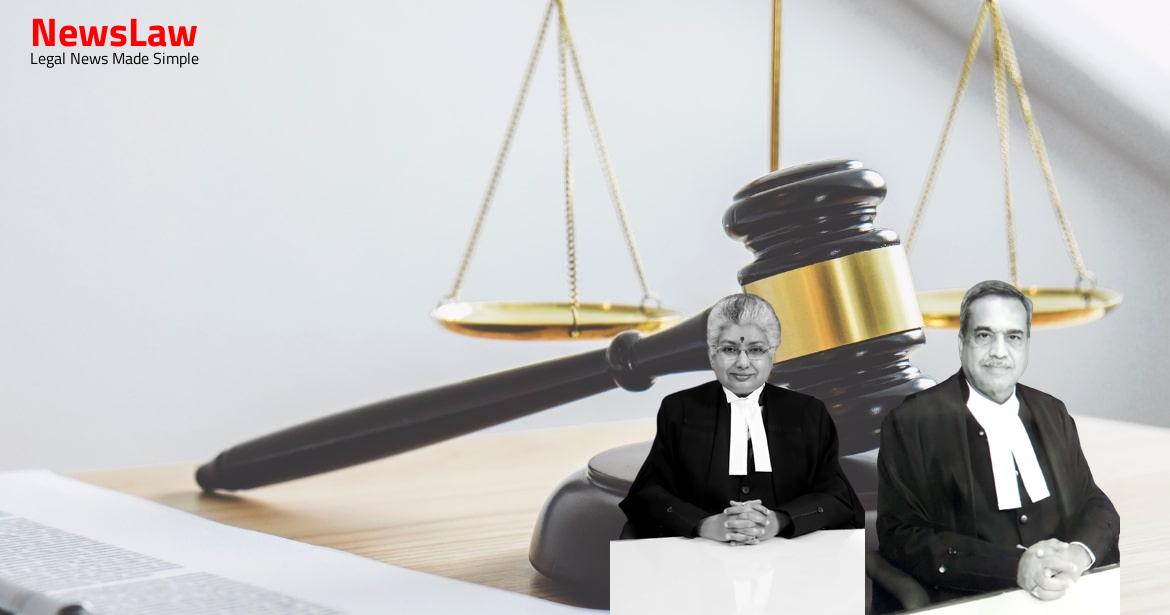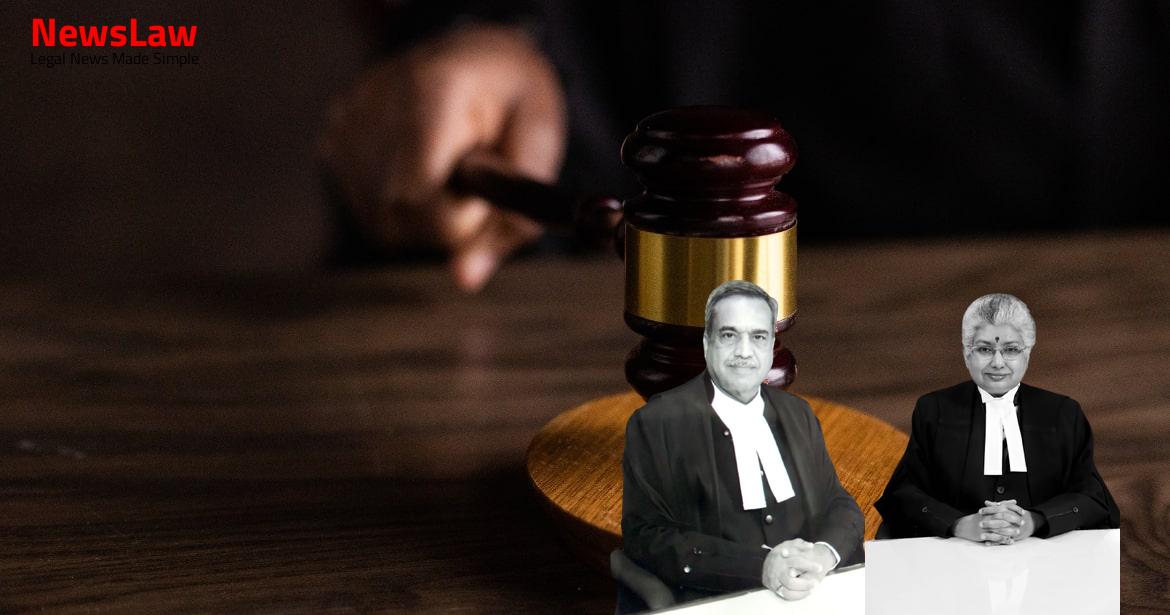In a landmark judgment by the Supreme Court of India, the rights of workers in Haryana under the Minimum Wages Act have been upheld. The case involved challenges to the Notification dated 27.06.2007, with Mr. Singh and Dr. Monika Gusain raising arguments on behalf of the workers. The Court’s decision marks a significant victory for labor rights and emphasizes the importance of fair wages and worker protection.
Facts
- The Appellant filed a Writ Petition challenging the Notification dated 27.06.2007 issued under Section 5 (2) of the Minimum Wages Act, 1948.
- The said Writ Petition was dismissed by the High Court.
- Aggrieved by the judgment of the High Court, the Appellant has approached this Court.
- In exercise of the powers conferred by Section 5(2) of the Act, the Finance Commissioner and Principal Secretary to the Government of Haryana, Labour Department issued a Notification on 27.06.2007 fixing/revising the minimum rates of wages in respect of different scheduled employments as mentioned in the schedule therein with effect from 01.07.2007.
- The High Court upheld the legality of Notes 1, 9, and 10 of the Notification dated 21.10.2015.
- The Act was deemed applicable to trainees according to the judgment.
- Categorization of workers in Brick Kiln was justified to prevent stagnation.
- Equal wages for men and women workers were mandated.
- Trainees were to be paid 75% of the wages applicable to their category, not falling below the Minimum Wages for unskilled workers.
- Prohibition of segregation of wages into components in the form of allowances was rejected.
- Domestic Workers and Safai Karamcharis were found to be incorrectly included in the list of scheduled employment by the High Court.
- The Appeal against the High Court’s judgment dated 18.08.2017 was filed by Special Leave.
- The minimum rates of wages were linked with the Haryana State Working Class Consumer Price Index.
- There was 100% neutralization of the rise or fall of the consumer price index number on a pro-rata basis.
- All workers, even those not mentioned by name in the employment category, were not to be paid less than the minimum wages for a similar category with the same skills.
Also Read: Supreme Court Ruling on Dowry Harassment and Suicide Case
Arguments
- Mr. Singh objected to the revision of minimum wage rates for Security inspector/Security officer/Supervisor based on the definition of ’employee’ in the Act.
- He argued against the government’s power to restrict training periods to one year.
- Mr. Singh also contested the classification of employees and the fixing of different minimum wage rates for the same class of work in the same scheduled employment.
- The Appellant argued for the permissibility of segregating wages into components like allowances.
- Concern was raised about Note 10 of the Notification fixing minimum wages for trainees at 75% of the wages of the category and limiting training to one year.
- It was argued that trainees should not fall under the Act and the State Government didn’t have the power to fix/revise wages for Security Officer/Supervisors.
- Mr. Harvinder Singh expressed grievance regarding portions of the Notification, claiming interference with the promotion policy beyond the Government’s jurisdiction.
- Reference was made to a settlement between employees and the employer regulating wages and the government’s limitations in altering conditions of service or settlements.
- The need to differentiate between fair wage, living wage, and minimum wage was emphasized, along with arguments against interference with contractual rights and obligations by the Government.
- The issue of higher minimum wages for unskilled workers after five years as semi-skilled employees was raised, questioning the deemed categorization and prohibition of segregation of wages into allowances.
- The judgment in Haryana Unrecognized Schools’ Association v. State of Haryana and Bidi, Bidi Leaves and Tobacco Merchants’ Association v. State of Bombay were cited to support arguments.
- Dr. Monika Gusain argued that it is the duty of the State to secure a living wage for all workers, citing Article 43 of the Constitution.
- The notifications under discussion were issued based on recommendations from an Advisory Committee after consultations with employers and workmen.
- The splitting of minimum wages into components is considered permissible as there is no prohibition in the Act.
- The Government of Haryana’s counsel contended that workmen are often exploited by employers and the notifications aimed to protect their interests.
- A deemed promotion from unskilled to semi-skilled worker was discussed as a means to entitle workers to the next grade of minimum wages.
- The Government argued that there was no material presented by the Appellants to demonstrate any loss caused by the notifications.
- The definitions of ‘wages’ and ’employee’ under Sections 2(h) and 2(i) of the Act were examined for clarity.
- The decision to protect trainees by ensuring they receive at least the minimum wages of an unskilled worker was highlighted.
- The State of Haryana defended the challenged notifications as measures to safeguard the fundamental rights of workers.
- Arguments were made regarding the definition of wages as encompassing all remuneration in accordance with the terms of the employment contract.
Also Read: Case of Technical Equipment Officer Appointment Criteria Dispute
Analysis
- The term ‘wages’ includes remuneration payable to an employee as a result of the terms of employment.
- Authority is conferred on the appropriate Government to fix minimum rates of wages if the wages in a contract are found to be low.
- The appropriate Government can modify the payment of wages term in a contract to increase them to minimum wages.
- The procedure for fixing or revising minimum rates of wages is outlined in Section 5 of the Act.
- The definitions of the employer and employee indicate that workmen employed through contractors come under the purview of the Act.
- The fixation of minimum rates of wages must consider all terms of the employment contract.
- Prohibition on segregating wages into components in a notification was deemed invalid.
- Trainees not paid any wages cannot be included in notifications.
- Only individuals employed for hire or reward fall under the definition of an ’employee’.
- Trainees not receiving wages should not have minimum wages fixed for them at 75%.
- Food given customarily by the employer should be provided separately.
- The Act operates on wages only and does not affect other terms of the contract.
- The government does not have the power to determine the period of training, as it is beyond the Act’s scope.
- The point of contention regarding the jurisdiction of the Government in issuing notifications was rejected.
- Contract workmen are indeed covered under the Act.
- Inclusion of Domestic Workers and Safai Karamcharis in scheduled employments was challenged.
- The government can only prescribe, fix, or revise wages based on the terms of the employment contract.
- Industrial adjudication under the Industrial Disputes Act 1947 has wide powers and jurisdiction to make appropriate awards in resolving industrial disputes.
- The Act does not differentiate between employees directly employed by the principal employer and those employed through a contractor.
- Any person employing one or more employees in a scheduled employment falls under the definition of an ’employer’.
- The Government does not have the power to alter terms of a contract, but can fix or revise minimum rates of wages regardless of existing contracts.
- Minimum wages once prescribed under the Act are considered as one pay package and not amenable to splitting up.
- Inclusion of certain positions in the minimum rates of wages notification can be deemed ultra vires the Act.
- The definition of ‘wages’ includes all remuneration payable to a person in respect of employment, excluding specific components like travelling allowance or housing accommodation.
- The period of training for a trainee depends on the contract between the employer and employee, and minimum wages are not to be split based on costs of necessities.
- Trainees receiving wages during training are considered ’employees’.
- Industrial tribunals have jurisdiction to confer rights on either party that may not be explicitly in existing agreements for ensuring industrial peace and justice.
- Industrial awards may impose new obligations on employers in the interest of social justice and harmony with employees.
- Segregation of wages into components like allowances is subject to considerations outlined by the Act and industrial tribunals.
- Industrial tribunals have wider jurisdiction to decide disputes and ensure industrial peace and progress for social justice.
- Prohibition of segregation of wages into components in the form of allowances in the Notification is impermissible.
- Security inspector/ security officer/ security supervisor cannot be included in the Notification.
- Trainees employed without payment of any reward cannot be covered by the Notification.
- Categorization of unskilled employees as semi-skilled based on experience is ultra vires the Act.
- Fixing the training period to a period of one year is beyond the jurisdiction of the Government.
Also Read: Supreme Court Judgement on Transfer of Mining Environmental Clearances
Decision
- The appeals have been allowed due to the aforementioned reasons
- The original names of parties involved should be used instead of generic titles like Respondent No. 1 or Petitioner No. 1
Case Title: HINDUSTAN SANITARYWARE AND INDUSTRIES LTD. Vs. THE STATE OF HARYANA
Case Number: C.A. No.-002539-002539 / 2010



